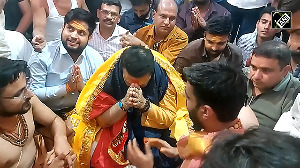He may be a nice man, but India needs an effective prime minister, says Harsh V Pant.
Things fall apart; the centre cannot hold
--William Butler Yeats
Rejecting claims by the Opposition parties that he had been trying to avoid any questioning over the telecommunications scandal, Prime Minister Manmohan Singh, has now offered to appear before the parliamentary committee investigating the case. During the final day of the Congress plenary session, the prime minister said that 'as proof of my bona fides' he would appear before the government committee examining the scandal 'if it chooses to ask me to do so.'
A bizarre spectacle is unfolding before the country. A government that has presided over this nation for the last six years now wants the country to believe that they really have nothing to do with the charade that has become of governance.
And the nation is now being informed that the United Progressive Alliance will soon start tackling corruption with seriousness. Describing corruption as 'a disease spreading throughout our society,' Congress chief Sonia Gandhi, went as far as outlining a proposal to fight official graft during the party's plenary. Not surprisingly, just a year-and-a-half into UPA 2's five-year term, there is widespread disillusionment with the government.
The corporate sector has lot confidence with a broad dissatisfaction with the Congress. Headed by Singh who still enjoys wide support, this government is seen as one of the most corrupt in recent history. The prime minister doesn't talk to those he is leading. And he is a man who seems no longer in charge of his own government.
Sonia Gandhi grandly talks of our shrinking moral universe but she is a leading a team of Congresswallahs who are busy pursuing a cynical brand of politics that stoops to the level of exploiting even those who have lost their lives in protecting their nation.
Congress General Secretary Digvijay Singh has had the gall to suggest that Maharashtra Anti-Terrorism Squad chief Hemant Karkare had called him a few hours before he was killed on the night of November 26, 2008 to discuss the threat to his life from Hindu extremists linked to the Malegaon bomb blast.
In his desire to court the Muslim constituency in north India and to deflect attention from scandals plaguing the party, Digvijay Singh has taken politics back to the days when in the name of secularism, political parties tended to blatantly exploit religious sensitivities.
More damagingly, recent revelations from WikiLeaks once again underline how the highest echelons of the Congress party have little or no understanding of the biggest dangers facing the country. Rahul Gandhi is reported to have informed the American ambassador that radicalised Hindu groups were more of a threat to India than Lashkar-e-Tayiba.
This is the person who will one day run the country, if he is not already. Has he taken the trouble of even doing some basic reading on the Lashkar? We were being told that he is being tutored for the last few years. It now seems that his tutors were people like Digvijay Singh.
So on terrorism, we are back to where we were before 26/11. National security issues should transcend politics but the lack of civil dialogue among political parties in India is an abomination. As a result, Indians are stuck between the grave incompetence of the Congress and the cynical political opportunism of the Bharatiya Janata Party.
An issue that should have united political parties across the political spectrum in a common purpose continues to divide them. Even when extremists continue to target the nation's hinterland, we continue to live in the fantasy world of our own making, first blaming the outside forces and then training guns at ourselves. It has once again become a Hindu versus Muslim debate: Whose terrorists are better, mine or yours?
At a time when India needs effective institutional capacity to fight the ever-more sophisticated terror networks, Indian police and intelligence services are demoralised to an unprecedented extent. The blatant communalising of the process under which the security forces have been forced to call off searches and interrogations for fear of offending this or that community has led to a situation where the security services have become risk-averse.
So long as India's response to terrorism will be characterised by a shameless appeal along religious lines with political parties trying to consolidate their vote-banks as opposed to coming together to fight the menace, we will continue to be viewed as a soft target by our adversaries and we will continue to fight terrorists in our streets.
Those who seek to challenge the authority of the Indian State feel emboldened to take advantage of the paralysed decision-making in New Delhi. Maladministration, dithering and incompetence has made making India ungovernable with a growing loss of respect for all major state institutions.
India is becoming a more corrupt nation over the years with the political establishment, police and lower judiciary playing a large role in this decline. And this corruption is having a corrosive impact on the social fabric of Indian society by undermining the trust of ordinary Indians in their nation's political system, political institutions and leadership.
For a party that won a decisive mandate just last May, this all pervasive decline is almost difficult to decipher. Economically, the party has not allowed the government to proceed with the second generation of reforms programme. Socially, the stench of corruption is now too odious to bear. All major institutions of governance are now struggling to regain their legitimacy.
Politically, the party in power is rapidly losing all the capital it had earned in last year's election. There is no coherence in the government with all departments working as if there are no national imperatives, only departmental interests.
It is time for the prime minister to assert his authority. Despite his noble intentions, Manmohan Singh is singularly failing to either manage the country well or to provide a vision for the nation's future. He may be a nice man, but India needs an effective prime minister. Maybe it is time for him to step down.







 © 2025
© 2025